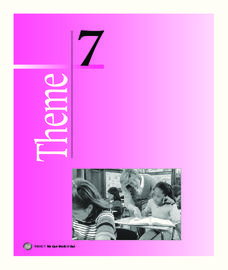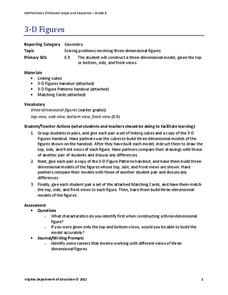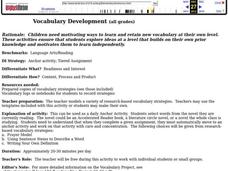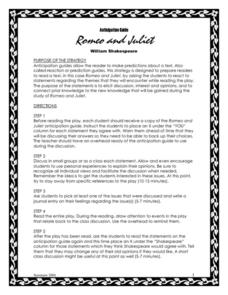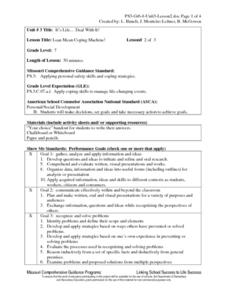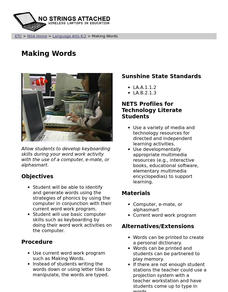Read Theory
Analogies 2 (Level 6)
Activate analogy skills with a straightforward exercise. Learners complete 10 analogies, using the bridge sentences provided as support while they determine word relationships.
Including Samuel.com
Agenda/Minutes for Instructional Planning Meeting
When it comes to the education of children with special needs, it's vital for there to be regular and open communication between all parties involved. This agenda nicely outlines key topics to discuss in weekly meetings including an...
Houghton Mifflin Harcourt
We Can Work It Out: English Language Development Lessons (Theme 7)
Listen, look, speak, and move are the routine steps of the English language development lessons found in a We Can Work It Out themed unit. Language proficiency is reinforced through picture cards, poems, and grand discussions about...
Virginia Department of Education
3-D Figures
Scholars construct three-dimensional figures to study dimension and side views. Learners build models using linking cubes to match views of different sides. After practicing with models, they attempt to match three-dimensional drawings...
Columbus City Schools
Asexual and Sexual Reproduction
Can you name a type of reproduction that produces no variation in the offspring? The multimedia lesson covers both sexual and asexual reproduction through videos and discussions. It includes topics such as genetic modification, meiosis,...
Rube Goldberg
Rube Goldberg Machines
Use humor to study simple machines! An engaging set of nine lessons allows learners to explore simple machines, kinetic, and potential energy as they work through cartoon renditions inspired by Rube Goldberg. Choose one or multiple...
University of Minnesota
Beautiful Brain: Brain Inspiration
"Neuroscientists consider Cajal as important to their discipline as Einstein is to physics." The first of four lessons has scholars view Santiago Ramon y Cajal's drawings of neurons. They reflect and respond to the art through writing...
Meadows Center for Preventing Educational Risk, University of Texas at Austin
Lesson 12 - Ed Suffix with Unchanging Base Words
Understanding different verb tenses begins with knowing how to decode words. A lesson on the -ed suffix with unchanging base words introduces readers to the past tense. Teachers present the skill with oral reading and spelling...
California Education Partners
John's Trip Disneyland
It all adds up to one. Pupils solve several items that involve finding sums of fractions in relationship to a whole. The assessment task uses fractions with unlike denominators to determine the amount of a tank of gas and the amount of...
Curated OER
Vocabulary Development
Learners utilize various vocabulary strategies. They use vocabulary logs to record strategies they have been taught, such as the Frayer Model (definition, picture, examples, non-examples), writing their own definitions, and using...
Curated OER
Prewriting
As a class, 7th graders observe examples of brainstorming and then complete brainstorming worksheets themselves. They compose and describe planning strategies. Prior to writing an essay, they identify the purpose and the audience.
Curated OER
Prioritizing Time
Tenth graders examine and identify how to avoid time conflicts in their own personal time schedules. They participate in a role-play about a time schedule conflict, participate in a class discussion, develop a list of their four most...
Curated OER
The Art of Persuasion-Analysis of Argument
Analyze advertising techniques in order to pinpoint persuasive strategies that writers use. These same techniques are then examined in persuasive speeches. You will have to find your own advertisements, but speeches are included. Finish...
Novelinks
Romeo and Juliet: Anticipation Guide
To prepare readers for some of the themes in Shakespeare's Romeo and Juliet, individuals complete an anticipation guide and then share their ideas in small groups.
Curated OER
Lean Mean Coping Machine!
Seventh graders apply coping skills to manage life-changing events. They plan and make written, oral and visual presentations for a variety of purposes and audiences, and then exchange information, questions and ideas while recognizing...
Curated OER
Heroic Vocabulary: Using Decoding Strategies and Thesaurus
Develop the decoding skills of your middle and high schoolers. Scholars participate in a classroom activity that requires them to decode a word with a prefix and suffix. They apply the skill of breaking the word into parts of meaning as...
Curated OER
Brog-Cube-the Spam
A Middle school special ed class uses the acronym SPAM to learn the 4 parts of writing. They employ 4 different colors to help them visually distinguish each part of writing in a given prompt. This lesson is vague and uses a strong...
Curated OER
Practice With Multiple-Meaning Words
Second graders work with multiple meaning words. They participate in a teacher led lesson about words with have more than one meaning. Everyone completes a skill building worksheet in which sentences using words with more than one...
Curated OER
A Tree Grows in Brooklyn
In this story structure lesson, students read the book A Tree Grows in Brooklyn and identify the characters, setting and main themes of the book. They answer a list of study questions about the book.
Curated OER
My Conflict Shield
Eighth graders discuss conflict. Working in pairs, they create lists of skills they have used in conflicts, skills they have seen used successfully but not used themselves, and skills they wish to develop. From their lists they identify...
Curated OER
Applying SQ3R to Texts
After a review of the SQ3R strategy, readers use the provided prompts to respond to a text. The value of this worksheet is in the additional questions that move the learner into higher levels of reasoning.
Curated OER
Bocce Ball - Lesson 6
Bocce ball - lesson 6 takes the game indoors and makes some adaptations. Use bean bags or juggling balls that won't bounce too much to play indoors. The focus is on throwing and using good form. The strategy will be slightly different...
Curated OER
Classifying Information About a Main Idea
Elementary learners explore language arts by completing a text identification activity. They discuss the importance of a main idea in a story or paper and how to present it properly. Then they practice identifying the main idea in sample...
Curated OER
Making Words
Young writers identify and generate words using the strategies of phonics on the Making Words computer program. Words are typed instead of having to use tiles or paper. Extension activities such as playing the memory game, drawing...




